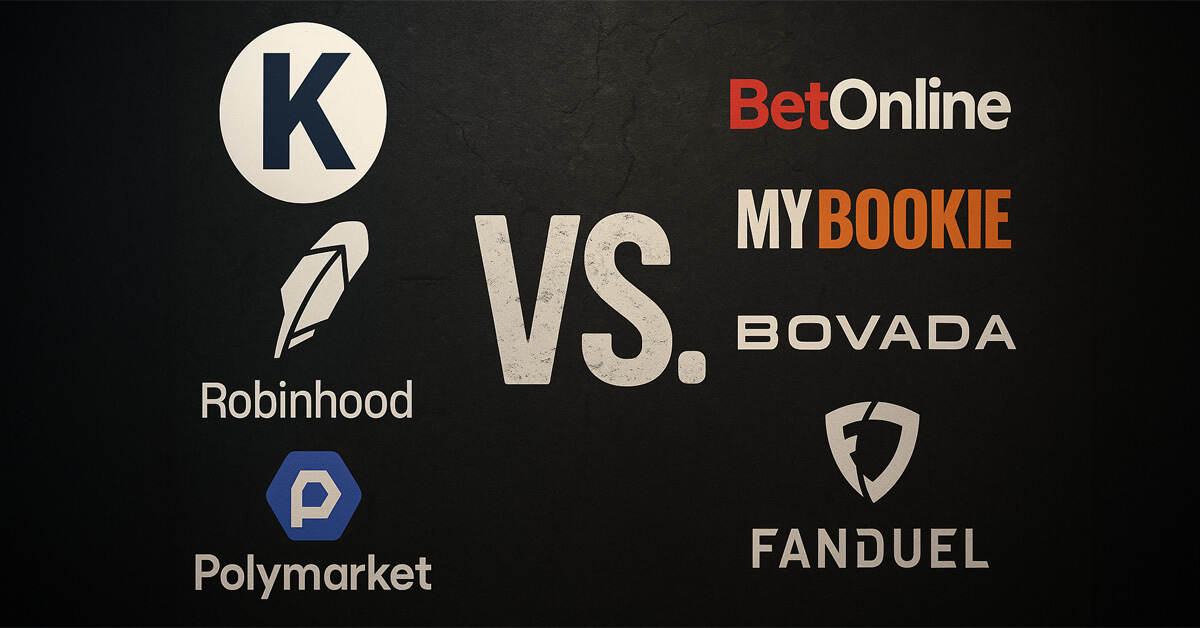
Picture yourself on Wall Street, but instead of stocks, people are trading predictions on sports outcomes and political events. That’s essentially what prediction markets are—a place where individuals buy and sell contracts based on their expectations of future events.
These markets have been gaining traction, and battling with the traditional world of sports betting. Intrigued? You’re not alone. This debate is heating up among regulators, operators, and, of course, us fans.
Are Predicitions Markets Just Sports Betting? Where the Lines Blur
Betting is all about predictions and placing money on the side you think will win. So aren’t these the same thing? Not quite.
What Are Prediction Markets?
A prediction market is a place where you can trade contracts based on the outcomes of real-world events. Platforms like Kalshi and Polymarket are leading the space, letting users bet on everything from election results and sports outcomes, to natural disasters.
It’s like the stock market, but instead of trading Apple shares, you’re trading the likelihood of, say, the Yankees winning the World Series.
How Do They Compare to Sports Betting?
Sports betting is pretty straightforward, and it has been around forever—you place a wager on a team or an outcome, and if you’re right, you win. Simple, right? But prediction markets are starting to look a lot like sports betting.
- Sports Betting – You’re giving money to the bookmaker at set odds. Your bet slip can’t be sold unless you are part of a betting exchange.
- Prediction Markets – You’re exchanging money with other people in the market for contracts that can be resold. Similar outcomes with different methods and formats.
The Legal Maze of Regulatory Showdown: Federal vs. State Authority
Prediction markets are under the Commodity Futures Trading Commission (CFTC). This means they’re classified as financial derivatives rather than gambling activities, allowing them to bypass the need for state-specific gambling licenses.
Sounds neat, right? But not so fast. States such as Nevada and New Jersey aren’t thrilled. They’ve issued cease-and-desist orders along with other states, arguing that these markets operate like unlicensed sportsbooks.
CFTC Oversight and State Pushback
The CFTC’s stance gives prediction markets a sort of “get-out-of-jail-free” card on a federal level, but states are pushing back hard. They’re concerned about consumer protection and the potential for market manipulation. After all, when money’s involved, who wouldn’t be worried about the fine print?
The CFTC cancelled a roundtable discussion in April 2025 that was supposed to iron out these issues, so for now, the tension between federal oversight and state authority continues to simmer.
Legal Precedents and Industry Reactions
Courts have mostly sided with prediction markets, asserting their legality under federal regulation. For instance, a 2024 ruling allowed Kalshi to operate despite state objections, reinforcing CFTC’s authority.
Yet, the debate persists over whether these contracts are just gambling in disguise. Critics argue that without stringent regulations, prediction markets could undermine established gaming laws.
The Money of It All: Growth, Taxation, and Market Dynamics
Prediction markets are booming. Kalshi reported a wild 300% increase in trading volume in early 2025, and about 40% of that was sports. Analysts are buzzing about the potential for prediction markets to become a trillion-dollar asset class by 2030, potentially rivaling the $16 billion annual handle of traditional sports betting.
Market Growth and Tax Arbitrage
Here’s where prediction markets really start to pull ahead: tax arbitrage. Unlike sportsbooks, which can face state tax rates as high as 51% in places like New York, prediction markets currently enjoy a more lenient federal tax environment.
This not only boosts their appeal but also sparks speculation that big players like DraftKings might dip their toes into prediction markets to dodge hefty state taxes.
Cannibalization or Coexistence?
Are prediction markets stealing the show from traditional sportsbooks? Is this town big enough for both of them?
Prediction markets attract a unique crowd—often younger, tech-savvy, and drawn to the low-hold, high-liquidity contracts they offer. However, prediction markets face liquidity challenges, with a significant portion of trading volume concentrated around major events like the Super Bowl.
Meanwhile, sportsbooks continue to lure in recreational bettors with familiarity, high payout parlays, and live in-play betting options.
Technology and Consumer Trends
Ah, technology—the game-changer in just about every industry today, and prediction markets are no exception.
Blockchain and Decentralization
Blockchain technology enables transparency in peer-to-peer trading without the need for middlemen. This not only lowers fees but also boosts trust among users. Platforms like Polymarket leverage the blockchain to offer trading fees as low as 1.5%. That’s much lower than the standard 5–10% “vig” that traditional sportsbooks take.
Analytics and the Wisdom of the Crowd
Both prediction markets and sportsbooks are increasingly data-driven. Prediction markets, in particular, use the “wisdom of the crowd” to their advantage.
A 2025 study found that Kalshi’s election contracts predicted outcomes with an 89% accuracy rate, outperforming professional pollsters. Impressive, right? This accuracy not only attracts individual traders but also institutional investors looking to hedge their bets.
Everyone Is Talking About It
If you follow political, legislative, and betting subreddits or X accounts like I do, you’ve seen predictive markets popping up more and more on social media. Some people just want to get the conversation rolling, while others want to share their opinions. One thing is sure—the hype is growing.
The Legal War Is Sprawling
Prediction markets aren’t just facing legal battles; they’re also up against established gaming interests. Kalshi, for instance, has set aside $100 million for legal expenses in 2025 to fend off state challenges.
Kalshi’s Legal Battles
Kalshi’s legal saga underscores the broader regulatory fight. Despite federal backing, states like Ohio and Illinois are relentless, arguing that prediction markets infringe on local gambling laws. The outcome of these disputes could well determine the future landscape of prediction markets in the U.S.
Tribal Gaming Interests
Meanwhile, tribal casinos in California are flexing their political muscles, lobbying Congress to restrict prediction markets on tribal lands. These tribes view prediction markets as a threat to their exclusive gaming rights, adding yet another layer to this already complex debate.
Do Predictive Markets Influence Voter Behavior?
Prediction markets like Polymarket turn public opinion into tradable data. They don’t just reflect what people think will happen—they can also shape how people act, especially in high-stakes moments like elections. The influence may be subtle, but it’s real.
Do People Let the Odds Decide?
Predictive markets like Polymarket often claim to reflect the “wisdom of the crowd.” But what happens when undecided voters see one candidate pulling ahead? Some do get swayed.
If Candidate A is shown as a sure winner, some might skip the ballot box altogether—“Why bother?” Others might rally for Candidate B if the odds suggest a close race, thinking their vote could make a difference.
So while prediction markets don’t tell people how to vote, they can subtly shape how people feel about the stakes.
Are Sportsbooks Watching Polymarket?
Yes and no. Sportsbooks typically rely on their own data models, market demand, and internal risk management to set odds. However, they’re not ignoring Polymarket either.
Prediction markets can offer a glimpse into public sentiment and betting behavior, which might influence sportsbook oddsmakers indirectly—especially on events like elections, where traditional data sources are fuzzy. But Polymarket isn’t a primary source; it’s more of a reference point in a broader toolkit.
Experts’ Opinions and What’s Next
So, what do the experts think? Opinions are as varied as the markets themselves.
Kalshi’s CEO argues for a unified regulatory framework, claiming prediction markets offer valuable insights into risk management. On the flip side, critics like the American Gaming Association warn that these markets could disrupt decades of responsible gaming efforts.
Industry and Academic Perspectives
Experts are divided here too. Some see prediction markets as a tool for better forecasting, while others view them as pure gambling. It’s a classic case of innovation clashing with caution.
Legislative and Technological Outlook
Speaking of conservative values, the new Trump administration could be the deciding factor. Proposed legislation like the Predictive Markets Clarification Act aims to clear the regulatory fog, potentially paving the way for prediction markets to flourish.
What’s Your Take On Prediction Markets and Sports Betting?
It’s clear that the debate between prediction markets and sports betting is far from over. The legal and economic questions remain unresolved, and the path forward is as uncertain as ever. Will prediction markets become a mainstream asset class, or will they remain on the fringes of legality? Only time will tell.
For now, it’s a waiting game as operators, regulators, and consumers navigate this evolving landscape, where finance meets fun in the unpredictable world of predictions.
Have you participated in a prediction market? What was your experience? Let me know what you think in the comments. I’m going to stick to my guns and keep betting at online sportsbooks because nothing beats handicapping a game and the thrill of hunting for soft lines—at least for me.




